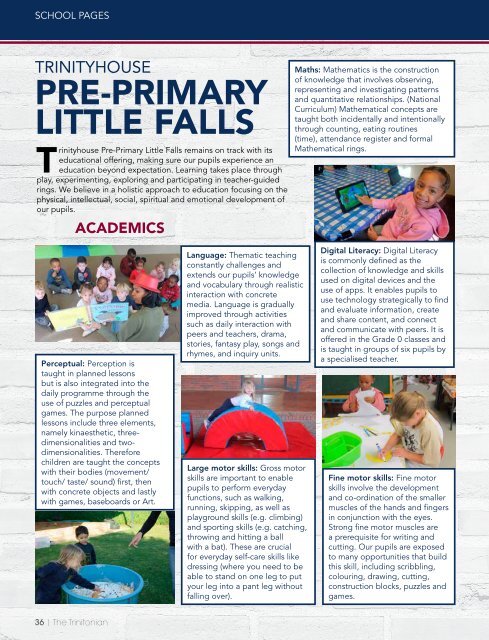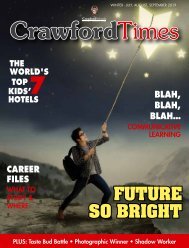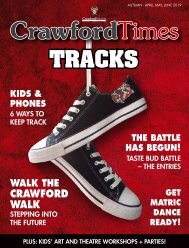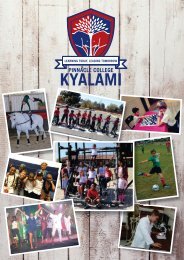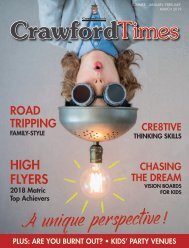TRINITONIAN 14 July 2019
You also want an ePaper? Increase the reach of your titles
YUMPU automatically turns print PDFs into web optimized ePapers that Google loves.
SCHOOL PAGES<br />
TRINITYHOUSE<br />
PRE-PRIMARY<br />
LITTLE FALLS<br />
Trinityhouse Pre-Primary Little Falls remains on track with its<br />
educational offering, making sure our pupils experience an<br />
education beyond expectation. Learning takes place through<br />
play, experimenting, exploring and participating in teacher-guided<br />
rings. We believe in a holistic approach to education focusing on the<br />
physical, intellectual, social, spiritual and emotional development of<br />
our pupils.<br />
ACADEMICS<br />
Maths: Mathematics is the construction<br />
of knowledge that involves observing,<br />
representing and investigating patterns<br />
and quantitative relationships. (National<br />
Curriculum) Mathematical concepts are<br />
taught both incidentally and intentionally<br />
through counting, eating routines<br />
(time), attendance register and formal<br />
Mathematical rings.<br />
Perceptual: Perception is<br />
taught in planned lessons<br />
but is also integrated into the<br />
daily programme through the<br />
use of puzzles and perceptual<br />
games. The purpose planned<br />
lessons include three elements,<br />
namely kinaesthetic, threedimensionalities<br />
and twodimensionalities.<br />
Therefore<br />
children are taught the concepts<br />
with their bodies (movement/<br />
touch/ taste/ sound) first, then<br />
with concrete objects and lastly<br />
with games, baseboards or Art.<br />
Language: Thematic teaching<br />
constantly challenges and<br />
extends our pupils’ knowledge<br />
and vocabulary through realistic<br />
interaction with concrete<br />
media. Language is gradually<br />
improved through activities<br />
such as daily interaction with<br />
peers and teachers, drama,<br />
stories, fantasy play, songs and<br />
rhymes, and inquiry units.<br />
Large motor skills: Gross motor<br />
skills are important to enable<br />
pupils to perform everyday<br />
functions, such as walking,<br />
running, skipping, as well as<br />
playground skills (e.g. climbing)<br />
and sporting skills (e.g. catching,<br />
throwing and hitting a ball<br />
with a bat). These are crucial<br />
for everyday self-care skills like<br />
dressing (where you need to be<br />
able to stand on one leg to put<br />
your leg into a pant leg without<br />
falling over).<br />
Digital Literacy: Digital Literacy<br />
is commonly defined as the<br />
collection of knowledge and skills<br />
used on digital devices and the<br />
use of apps. It enables pupils to<br />
use technology strategically to find<br />
and evaluate information, create<br />
and share content, and connect<br />
and communicate with peers. It is<br />
offered in the Grade 0 classes and<br />
is taught in groups of six pupils by<br />
a specialised teacher.<br />
Fine motor skills: Fine motor<br />
skills involve the development<br />
and co-ordination of the smaller<br />
muscles of the hands and fingers<br />
in conjunction with the eyes.<br />
Strong fine motor muscles are<br />
a prerequisite for writing and<br />
cutting. Our pupils are exposed<br />
to many opportunities that build<br />
this skill, including scribbling,<br />
colouring, drawing, cutting,<br />
construction blocks, puzzles and<br />
games.<br />
36 | The Trinitonian


